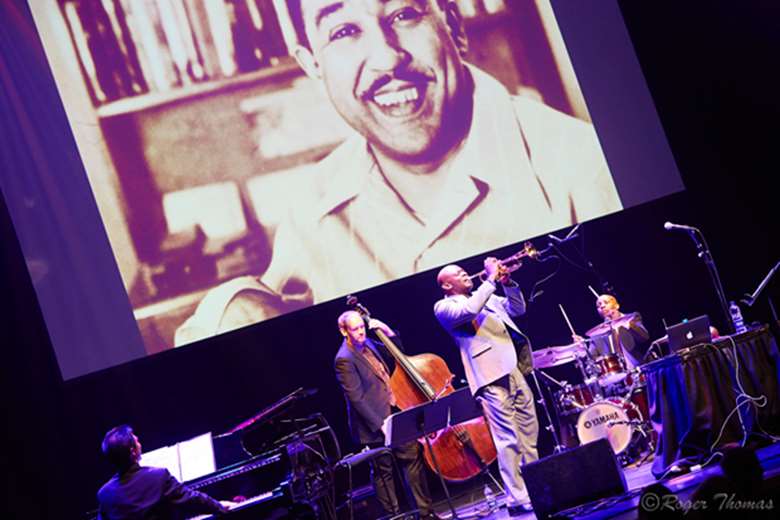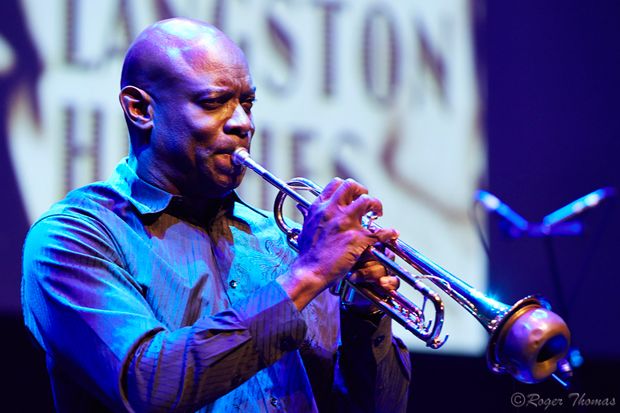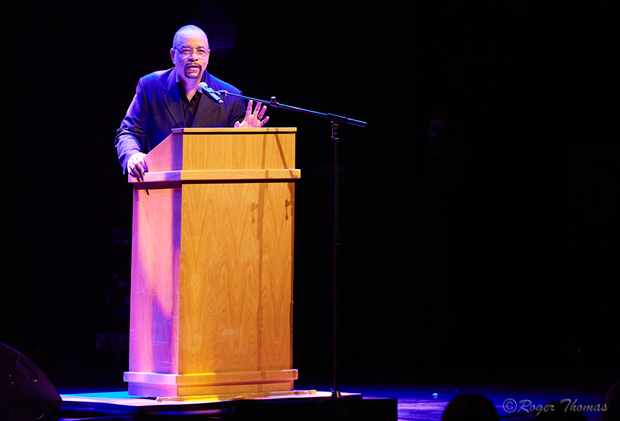Ice-T and the Ron McCurdy Quartet preach the gospel of Langston Hughes at the Barbican
Tuesday, November 24, 2015
Ask Your Mama: 12 Moods For Jazz, an epic poem about the struggle for artistic and social freedom experienced by Africans and black Americans during the early 1960s, was never performed in Langston Hughes’ lifetime.

By 1967, the writer, social activist and leader of the Harlem Renaissance had written the poetry and some equally poetic musical cues (“drum, alone, softly... but gradually building to uptempo as the metronome of fate begins to tick faster and faster”) and was in talks with the great bassist and composer Charles Mingus about a score. But Hughes died before the project could be realised.
It’s hard to know what it would have sounded like, but the poet would surely have approved of trumpeter and composer Ron McCurdy’s (below) setting of the text, which brought the house down at the Barbican on the penultimate night of the London Jazz Festival.

After a short archive recording of Hughes introducing the poem, in which “the unhip... those who may not quite understand what the poem is about” were instructed to consult the liner notes, McCurdy invited us to treat the evening like a Southern Baptist church service (“can I get an amen?”). On came his co-narrator, rapper the Right Reverend Ice-T (below), taking his place at a little wooden lectern, and we were away – swinging through Harlem, borne by bluesy trumpet shouts, gospel refrains, shuffles, Cuban montunos, hip-swaying Latin cha cha and calypso.
A set-piece solo for Yuma Sung brought bursts of Art Tatum-esque stride piano, cascading octaves and theatrical tremolo; drummer Mark Mondesir contributed rumbling tom toms and crashing waves of cymbal; and bassist Mark Hodgson’s playing was bluesy and wonderfully morose, his walking tones reassuringly burly.

The two narrators could not have been more different. McCurdy emphasised the musicality of the language, he broke into song (a wordless lullaby of arresting tenderness), he hammed up the theatre and he regularly had the audience in stitches. The rapper was more reserved, his delivery halfway between a sneer and a drawl, which made the lines sound all the more subversive. And there are some great lines.
The text is so varied and so rich in imagery and there were times when it reminded me of Under Milk Wood, in that it’s a snapshot of everyday life, though here the setting is “the quarter of the negro” rather than a sleepy Welsh village. As sepia-toned photographs appeared on a big screen behind the stage, there was talk of “gangrenous icing on a 20 storey housing project” and ballots that “drop in boxes where bullets are the tellers”; countless references to musicians; and allusions to Communism, in which Hughes dabbled, via mention of “reds” and a fantastic passage about being “lost in Castro’s beard”.

Lyrics from W.C. Handy’s ‘Hesitation Blues’ – “How long must I wait? Can I get it now or must I hesitate?” – regularly make an appearance, as a call for civil rights. And, providing comic punctuation throughout the suite, there are the "your mama" jokes, which come as a retort to incidences of everyday racism and assumptions based on the colour of Hughes’ skin. “They ask me, ‘where did I get my money?’… ‘Could I recommend a maid?’ … ‘My blackness, will it rub off?’ I said, ‘Ask your mama’.”
More than anything else, they set the tone for the performance, which was predominantly playful and feel-good, never making light of the inequality described in the text but choosing to excoriate it by highlighting its absurdity and to counter it with good humour. Only Mood 11, which arrived with invocations to Yard Bird (Charlie Parker’s nickname) over a tempestuous, free jazz backdrop was truly dark in its rendering.
What was depressing, however, is the extent to which Hughes’ words are still applicable today – talk of riots and recession seemed particularly apt – and McCurdy could have done more to bring this out, perhaps by referencing contemporary scenes in the visuals. Still, his aim was to “spread the gospel of Langston Hughes” and he certainly achieved that. He had a capacity crowd hanging on the poet’s every word and on their feet, cheering themselves hoarse come the end. He got his Baptist church atmosphere too – there were plenty of “Amens”.
– Thomas Rees @ThomasNRees
– Photos by Roger Thomas